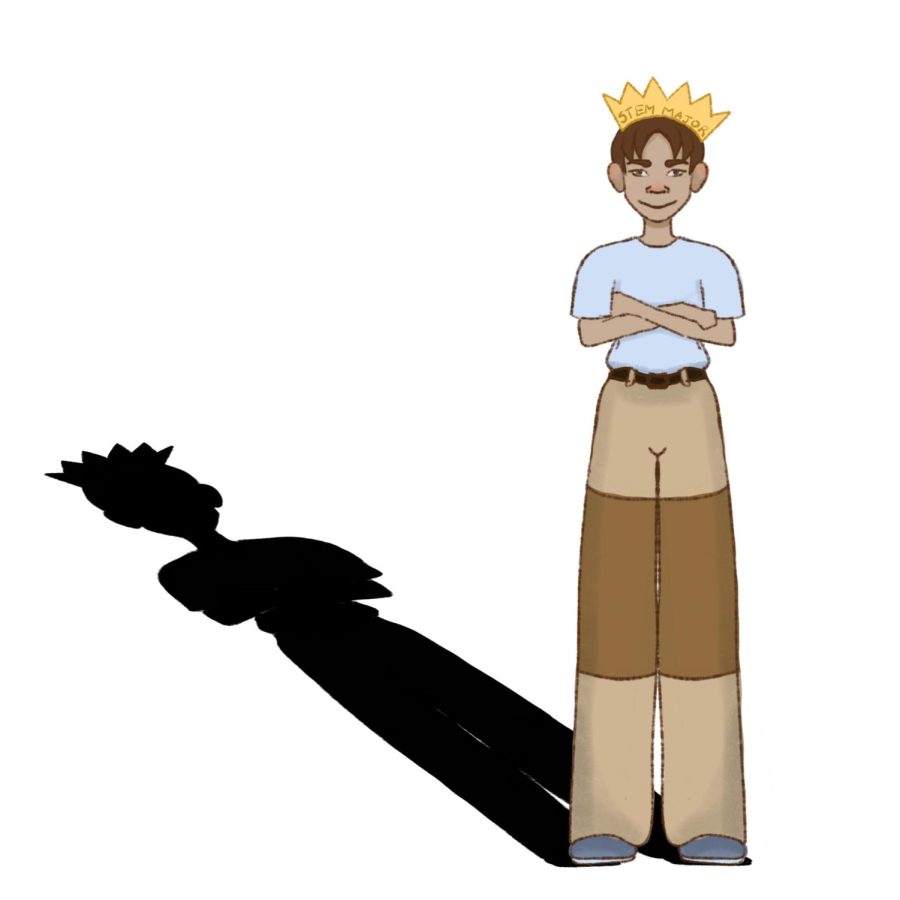Opinion | It’s time to drop the STEM superiority complex
November 18, 2022
When I arrived at college, I knew Pitt enrolled a lot of STEM students, but I still had no idea what awaited me. I quickly became aware that some students were perceived as the intelligent and hardworking STEM students who carry the world’s weight on their shoulders, and there is everyone else who wanders through school and has no chance at a high-paying career.
We have all had those incredibly awkward conversations, when you meet someone new and the first thing you ask each other is your majors. As a political science major, I started to recognize a trend of people in STEM responding to my answer with something like, “that’s so fun” or “I wish I did that.”
Despite these responses, I can tell these people don’t find anything interesting about what I’m studying — they just want to point out how their major is harder than mine. I know this because even though most days I enjoy my major, who can look at politics and genuinely describe it as “fun”? My sympathy is running low, so every time I find myself caught in this discussion, all I want to say is, “If it’s so fun, then why don’t you do it? Society will persevere with one less biology major, I promise!”
As someone who’s always found themself drawn to reading and writing, it surprised me when I got to college and people treated those studies more like hobbies than worthy areas of academia. It seems like the same people who compliment my writing are the same ones who give me a look of sympathy and question my career outlook. People get so caught up Googling hypothetical career salaries that they forget the reasons for choosing areas of study. I can admit that I’m terrified of numbers, and my natural science knowledge starts and ends with identifying the powerhouse of the cell, so I know that a STEM career would make me miserable. I can see how that realization may not be so clear-cut for everyone — and that is understandable — but I would prefer that some people soul search instead of acting like my studies are a joke.
The beginning of college is already challenging enough. Everyone is trying to find their spaces, both socially and academically. I remember feeling like an outcast at a school that I’m so proud to attend. Whenever someone spoke down on my major, it made me feel inadequate and question if I deserved to go here. I always knew that I didn’t want to become a doctor or an engineer, but when everyone around me refused to acknowledge any other potential career path, it made me question everything.
The most difficult part about dealing with STEM superiority is the tendency for these students to take their difficulties out on you. It’s one thing to complain about your classes — everyone does it. The worst complaints are the ones that come from a place of insecurity and project onto someone else. Believe it or not, the University of Pittsburgh is not a dystopian universe where we are assigned our major and must stick to it. I know that it can be scary to change your path, and it isn’t always easy to change your major. The non-STEM majors you are talking to have likely dealt with this pressure as well.
I find that those who loudly complain that humanities gen-eds are a waste of time and that they should be exempt from them are often STEM students. If anything, shouldn’t a class in a different area be a break from the usual required major classes? Of course, going into a course thinking it is unimportant will affect how you engage and retain the material. I’m not saying that you should take time away from your major to focus on classes that you took to fill a gen-ed. I only hope people expand their knowledge — even if it doesn’t fall into the STEM category.
At the end of the day, what frustrates me the most is that this outlook is an oversimplification of not just the academic field, but people as a whole. To make real progress we need to encourage communication between disciplines. Right now, there is much miscommunication on important issues like the COVID-19 pandemic and climate change. Scientists and writers need to communicate so the public can understand and benefit from the work done. Also, in defense of the STEM majors, I’m not going to pretend like my brain doesn’t shut down seconds after I ask about your research — but at least I’m acknowledging it and trying to change.
I didn’t realize the importance of studying in different fields until I took a class this semester that combines science and communication. The class is about coding data figures and using them in public-facing writing. Once I got past the initial fear of coding, I realized how finishing the visualizations is only half of the battle, and the rest is about having to present them in a way that is digestible while also making sure that I fully understood the material myself. It has made me realize how the professional world could benefit from education that takes an approach which incorporates multiple disciplines. Creating a false division between majors harms everyone by preventing them from learning skills and seeing different perspectives.
We come into college and are taught to identify ourselves by our majors. We all come from different places and start over while searching for something to have in common with someone else. Ultimately, there comes a time when we realize that this separation is superficial outside of the assigned coursework. While we have to pick a general direction that applies to a specific career path or just fills the requirements so we won’t be in college forever, it is important to stay curious. It is great that your future profession excites you, but it is also important to find other things that can fulfill you intellectually that don’t involve your nine-to-five.
For those of you living with the STEM superiority complex, there is hope for you. And for anyone who has to face those with the complex, remember that the only person you need approval from is yourself, and your worth is not determined by the hours you spend at the library.
Jameson Keebler writes primarily about pop culture and current events. Write to her at [email protected].









